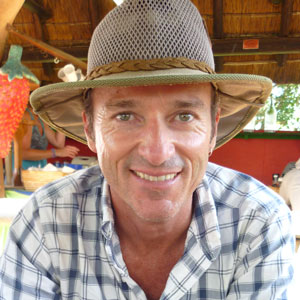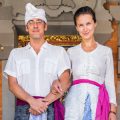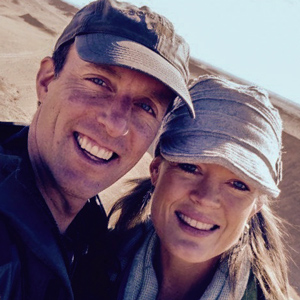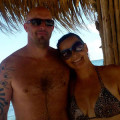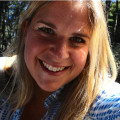“My Car Is My Home, the Planet Is My Backyard”: On the Road with Bruno Caumette
This is a traveler case study. (Read others or nominate yourself.)
For almost two decades, Bruno Caumette has made his home in a Toyota Land Cruiser. He’s been around the world once and is currently working on his second voyage. His stories are touching—and his photos are incredible.
Introduce yourself!
I was born in France, but by now I’ve spent as much time outside of my birth country than in it. In 1998, after working for fifteen years, I bought myself an old Toyota Land Cruiser, converted it into a home on wheels, and set off on the road. I was heading for Africa, but beyond that I didn’t have a plan, a timeframe, or even money.
Fourteen years later, I’d returned to Africa—after having traveled overland through places like Afghanistan, Mongolia, Siberia, Korea, Alaska and Patagonia—inadvertently completing an around-the-world trip. I’d driven over 400,000km (that’s 248,548 miles) and taken three ferries, but never once hopped on a bus, train, or plane.
Now I’m three years into my second around-the-world trip. It’s no longer a trip, it’s a lifestyle. My car is my home and the planet is my backyard.

What inspired you to travel?
As a child I would go into the forest near my house and look under rocks and in trees. Simple curiosity drove me. I had a perpetual desire to see what was just around the next corner.
I joined the Marines after secondary school to get out of France, see a bit of the world, and it was the only way I knew how to do it without having to pay money. After that, I worked in a bakery half the year. During the other half of the year I would take my backpack, choose a region of the map, and explore it until it was time to re-open the shop the following spring.

On the doors of my camping car are photos and quotes from Antoine de St-Exupery’s book, Le Petit Prince.
This book is my bible, and I try to embody its lessons in my life. I refuse to grow up and become a Big Person, living life too seriously, losing my creativity, living with worry and fear, thinking about the future. It’s curiosity that has led me to drive down each road, around each corner, past each border, into each new country.
Tell us more about how your curiosity continues to drive you.
When I was a child, I obsessively watched a show called Daktari about an animal vet in Africa. It inspired me to travel in order to visit a particular endemic animal species, a unique animal behaviour, to volunteer for an animal cause, or to capture that perfect animal photo.

I spent weeks in the Empty Quarter desert of Oman to spot the endangered Arabian Oryx, and mounted a trek in the Simien Mountains of Ethiopia to spot the Gelada baboon and the Abyssinian wolf. I traveled to the tip of Argentina to watch orca whales surf on the beach to catch seals.
I came face to face with wild tigers in India, wild gorillas in Central Africa, and grizzly bears in Alaska. I volunteered with lion rehabilitation in Zimbabwe and saved baby sea turtles on a protected beach in Mexico.

When I volunteered at a tiny chimpanzee refuge in Congo, I was helping habituate a group of chimps for future ecotourism. I had to swim out in a crocodile-filled river every day to feed the chimpanzees that were living on the island. The first time I visited them, the dominant chimpanzee came up to me, pulled my hair, rubbed my forehead with his finger and sniffed it, and then accepted my oranges.
There was a baby chimp that refused to take the bowl of food and would only eat it if I held it and helped feed him. On my last day at the refuge, he refused to smile at me, to greet me, and to eat. It was as if he knew I was going. It was heartbreaking and breathtaking at the same time.

Tell us about an encounter fresh in your mind.
When I left France, I left a love there. She was supposed to come with me, but got cold feet at the last moment. I knew I had to go anyway. When I left, I never looked back, and I spent the next fourteen years traveling the world solo. I knew that I’d always choose this life over a “regular” one of marriage and kids, even if it meant being alone.
Three years ago I was on the beach of Mozambique, packing up the car and doing an oil-change. Suddenly, the wind died down and the sun peeked through the clouds. I wasn’t in a rush (I never am), so I decided to stay on the beach another day.
That evening, a young woman and her friend pulled into the beachside campsite and began to set up their tent. She was from Canada and spoke French, so we got to chatting about travel. She was really impressed with my Petit-Prince painted camper van and my lifestyle and there was an instant connection. I actually felt a flash!

When she commented, like many, that she wished she could live like me, I told her, like I always say, that there was an empty seat if she wanted it. Within twenty-four hours, she’d changed her plans to return to Canada, where she had a Master’s degree program and an internship set up and waiting for her. She hopped into my vehicle and into my life, and she never looked back.
I’d shelved the idea of sharing my life with someone. But now, we’re married and even planning to start a family. It’s wonderful to get to show the world to someone I love, and it makes for a very special second around-the-world trip.

How do you pay for your continued travel?
I began to work toward my dream early on. With my father as co-signer, I took out a bank loan and purchased a dilapidated property on the Mediterranean in France and a fledging business in the touristy part of town. I worked in my bakery during the summer season, backpacking around the world during each off-season in order to keep sane (there were some awesome trips, like motorbiking across Africa, driving from France to Kathmandu, sailing across the Atlantic, and boating through the Amazon!).
My work hours were incredibly long, but I knew what I was working for. I’d always told myself that I’d work fifteen years, buy myself a boat, and then go. I’d figure the rest out later.

On that fifteenth year, my family and accountants were all telling me to stay. Just one more year, they said. I’d set myself up better financially if I just waited a bit longer. But I’d promised myself I’d go, and so I did.
I’m incredibly lucky that my property and business were sound investments. Once the business was paid off, I was able rent it by the month to someone. I rent my home as well, and now that prices of property along the Mediterranean have skyrocketed, I make enough each month to live a simple, comfortable life.
It wasn’t always like this. One off-season, I had just enough money to fly myself to Australia and buy an old beat-up van. After that, I had to find tourists who wanted rides to different cities, and they’d pay for my gas and food. When I left, I sold the car at the price I’d bought it for to fly myself home. I always figured out a way to make my travels happen, but it’s definitely easier now that I have a stable income.
Tell us about a memorable encounter you can’t get out of your head.
I was in the Central African Republic, mounting an expedition into the forests to see gorillas. I’d found an interpreter/guide/ranger, a pirogue, a paddler (needed to maneuver past the hippos in the river), and a pygmy tracker called Yomaete. Normally, pygmies are treated like lesser people, but I refused to let him eat apart from the rest of us. We spent three weeks in the forest looking for the gorillas, and Yomaete and I developed a deep connection.
He was also surprised by me. I was somehow different from the other foreigners he’d interacted with. I’d come to the forest in a pirogue, I was spending weeks there, tasting all sorts of strange forest delicacies. When we returned to Yomaete’s village, his wife gave birth to a son. Yomaete asked me if he could name his son after me. I was deeply honored.
Seven years later I returned to Yomaete’s village. Sometime in those years, little Bruno had died. But in his place was a new baby—no more than a year old—that Yomaete had also named Bruno. I couldn’t believe that after all these years, he still felt deeply connected to me to honor me that way again.

What has surprised you while on the road?
The first time I left Europe was on a trip through the Sahara Desert with my brother. I was barely twenty, and my mother thought she’d never see me again. In Algeria, at the edge of the desert, we needed some parts for our vehicle that were impossible to find. An Algerian man offered to help, and he took off to a nearby town to get the parts for us – parts that were rationed yearly to each vehicle-owner.
In the meantime, he offered us lunch and tea in his family home. We’d parked our car outside, and I remember both my brother and I continually peering out the window because we were worried that someone was going to steal our vehicle while we were gone.
The man came back with our spare parts, things that must have cost him several months salary (not to mention the ration). He refused payment. We tried to explain that we had all this useless Algerian cash we needed to get rid of, but it was no use. He wouldn’t take our money.
I remember the shame I felt that I’d been worried about my car being stolen when this man and his family had shown me hospitality and generosity that I’d never experienced anywhere before. Muslims weren’t like they showed us on television in France. It was a confirmation of what I already knew intuitively—that I needed to go out in the world to discover my own truths rather than accept those fed to me by the media.

The great debate: aisle or window?
Aisle: I don’t mind people asking me to move so they can get out, but I don’t want to bother others by having them move. That’s probably why I prefer my camping car to an airplane seat!
Where to next?
I travel full-time, except for the three weeks each year I go to France to visit my family. I guess we can call those three weeks my holiday.
At the beginning of the year, my wife and I left Africa (having spent three years there) and have been in the Middle East for several months (Saudi Arabia, U.A.E, Oman, Iran, and Turkey). As I write this, we’re about to head into Europe, which is a continent I haven’t brought my camper van into in over a decade. We’re like migratory birds!
Stay up to date with Bruno at Wandering Footsteps or on Facebook.
###
